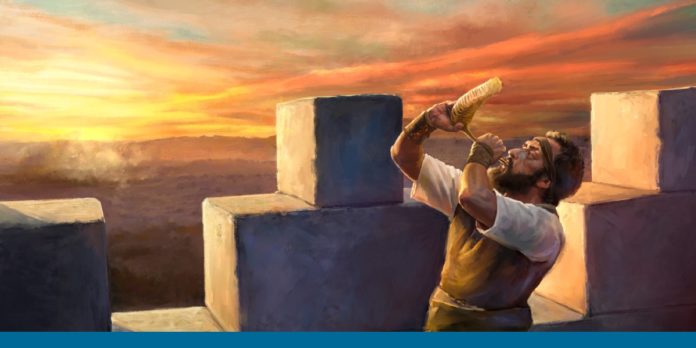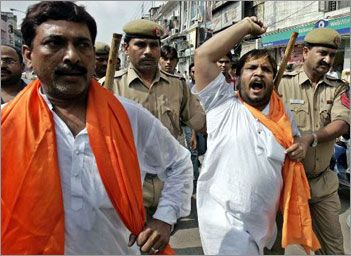By Robin Sam
‘Son of man, I have made you a watchman for the house of Israel; therefore hear a word from My mouth, and give them warning from Me’ (Ezekiel 3:17).
THE word ‘watchman’ conjures up different images in our minds. To the apartment dweller in a big city, a watchman is someone who is at the gates letting people in and out. A night watchman in cricketing terms means a man whose batting skills are questionable. He is sent in when a wicket falls before the end of the day’s play to avoid the dismissal of a prodigious batsman in tough conditions. A night watchman in journalistic circles is someone who’s been assigned the night shift.
The watchman in Biblical terminology is a prophet. A prophet’s job is not only to prophesy but also watch over God’s people. Although he does not have the responsibilities of a shepherd (used in the sense of being a pastor), a prophet watches over God’s children to check if they are on the path of error and warn them to get back to God’s ways if they are.
When God told Ezekiel that He had made him a watchman for the house of Israel, God was using metaphorical language. In olden days, Israelites had men watch over their cities from watchtowers. So, when God spoke to Ezekiel about being a watchman, the prophet understood the import of the word fully well.
The verse in Ezekiel 3:17 is repeated in Ezekiel 33:7 also. The prophet is supposed to hear from God and relay it to the people. What an honor it is to be God’s mouthpiece. In the New Testament, we are called a chosen generation by Apostle Peter. In 1 Peter 2:9, we read: ‘But you are a chosen generation, a royal priesthood, a holy nation, His own special people, that you may proclaim the praises of Him who called you out of darkness into His marvelous light.’
Today, we are both royalty and priestly class. We are chosen and called out for a special purpose. We have to proclaim the praises of the Lord who made us in His image and transforming us now into His likeness. If you are a child of God, redeemed by the blood of the Lamb of God, you are called out to be a watchman, too.
Three important tasks were given to Ezekiel, the watchman-prophet.
1. A watchman is one who warns people
…warn them for Me, says Ezekiel 3:17 and 33:7. A watchman does not have a petty, personal agenda. He hears from God, speaks for Him. In other words, he speaks instead of God. To whom should the warning be given? The Bible is very clear on that. He should warn both the wicked man and the righteous man. Warning the wicked and the righteous men is not an option. It is a mandate given to the prophet. If the prophet warns the wicked and he does not heed it, he will die in his iniquity but the prophet would have delivered his soul from God’s wrath. Ditto with the righteous man.
We presume the righteous does not need any warnings. Somehow, we have been made to believe that the righteous are doing perfectly fine and there is no cause for concern for their souls. Nothing could be further from the truth. ‘There is none who is righteous, says the Bible (Psalm 14:3; Romans 3:10).
Our righteousness is not our own, it is from God. Our righteousness is like filthy rags, says Isaiah 64:6.
Ezekiel 3:20 gives us a terrible warning. It should jolt us from our spiritual lethargy. ‘Again, when a righteous man turns from his righteousness and commits iniquity, and I lay a stumbling block before him, he shall die…he shall die in his sin, and his righteousness which he has done shall not be remembered.’
If a righteous man stumbles and dies in his sins, his righteousness shall not be remembered, says God. That’s why we need to stay close to the Word of God every day, fellowship with the Spirit of God every day and ask for a cleansing by the blood of Jesus Christ every day. Matthew 24:13 says: ‘But he who endures to the end, shall be saved.’
To be a watchman means not turn a blind eye to the sins around us. We are called to show the right way to both the wicked and the righteous. When you see a fellow believer slacken in his faith, encourage him. When you see your child turn rebellious, warn her.
2. A watchman is one who hears from God
‘therefore hear a word from My mouth’ (Ezekiel 3:17).
And again in verse 22, God told Ezekiel: ‘Then the hand of the Lord was upon me there, and He said to me, “Arise, go out into the plain, and there I shall talk with you.’
Most often, we equate valleys with spiritual lows of our lives. Yes, valley experiences are painful. Valley experiences are nerve-wracking because we feel like we are left alone there. But then, valleys are also places where God speaks to His children. David knew this and confessed: ‘Yea, though I walk through the valley of the shadow of death, I will fear no evil; For You are with me; Your rod and Your staff, they comfort me.’
And, God indeed spoke to the prophet in the valley. Ezekiel saw the glory of the Lord the first time on the banks of River Chebar. At the valley, once God spoke, he saw it once again there.
When God spoke, something miraculous happened. ‘…when I speak with you, I will open your mouth, and you shall say to them’ (verse 27). There is a connection between speaking and hearing. The one who cannot hear most likely cannot speak either. When a dumb boy was brought to Jesus Christ in Mark 9, we see the Lord casting the deaf and the dumb spirit out of him.
God gave Ezekiel a clear instruction on what to speak. He must preface his prophecies by saying: ‘Thus says the Lord.’ A prophet always speaks from the authority of God. He does not speak on his own. His words, although voiced by him, are not authored by him. They are words that come from the Throne of God.
Today, when you speak in God’s authority be careful not to mix your feelings and emotions. Your likes and dislikes should not hinder you in delivering God’s message. Say only what you have been given to say. ‘But let your ‘Yes’ be ‘Yes,’ and your ‘No,’ ‘No.’ For whatever is more than these is from the evil one,’ warned the Lord in Matthew 5:37.
Our God is a merciful God, but He does not take presumptuous words lightly.
‘You shall not add to the word which I command you, nor take from it, that you may keep the commandments of the Lord your God which I command you’ (Deut. 4:2).
‘Do not add to His words, Lest He rebuke you, and you be found a liar’ (Pro. 30:6).
‘For I testify to everyone who hears the words of the prophecy of this book: If anyone adds to these things, God will add to him the plagues that are written in this book; and if anyone takes away from the words of the book of this prophecy, God shall take away his part from the Book of Life, from the holy city, and from the things which are written in this book’ (Rev. 22:18-19).
3. A watchman is one who knows when to avoid danger
Being a prophet was a risky proposition in the Old Testament times. Often, he walked a lonely path. He faced danger from both people and kings if his prophecies or warnings displeased them. Yet, OT prophets persisted in their calling. Elijah, Elisha, Jeremiah, Ezekiel and the minor prophets were all people who paid a huge price for the work of the Lord. The New Testament apostles were no different. in 2 Corinthians 11:26-27, Apostle Paul describes his ordeal because of his ministry: ‘…in journeys often, in perils of waters, in perils of robbers, in perils of my own countrymen, in perils of the Gentiles, in perils in the city, in perils in the wilderness, in perils in the sea, in perils among false brethren; in weariness and toil, in sleeplessness often, in hunger and thirst, in fastings often, in cold and nakedness.’
Although a prophet’s path is arduous, God does not want His children to be foolhardy. He often warns us of impending danger. He has given us the grace and wisdom to avoid pitfalls, traps and dangers.
In Ezekiel 3:24, God gave a piece of sound advice to the prophet: ‘Then the Spirit entered me and set me on my feet, and spoke with me and said to me: “Go, shut yourself inside your house.’
Why? Because in the succeeding verse, God told him that people were ready to tie him up with ropes.
One of the gifts of the Holy Spirit is discernment. We are called to distinguish between spirits. The power of the Holy Spirit to distinguish between an opportunity and a danger is often is available to all believers. Often, the believer is unclear about the spirit that is in operation in him. We must be able to distinguish between the influence of God and the influence of the devil. Knowing what to speak is not much if you do not know how to speak and where to speak.
There are times for action and there are times for resting and regaining strength. The God who asked Moses to present himself before the pharaoh (Exodus 10:3) is the same God who appeared to Joseph and asked him to rush to Egypt with Mary and baby Jesus (Matthew 2:13).
Today, we need to choose our battles wisely. If it is the Lord’s battle, the victory is assured. But, if it is ours, we need to hand it over to God.
Ezekiel had a long and glorious ministry and hence he could act on his own. His ministry may have suffered terrible things if he exposed himself before the appointed time.
There are times when we need to be vocal and times when we need to be silent. There are times when we need to arise and shine and times when we need to humble ourselves under the mighty hand of God.
This message will be incomplete if I do not share with you the three things God expects in a watchman.
1. Guard your heart first
Proverbs 4:23 has an important message for all believers, especially for those who desire to have a prophetic ministry. Those who want to be the watchmen of God should take heed of this verse: ‘Keep your heart with all diligence, for out of it spring the issues of life.’
Before you can guard anyone, make sure you guard yourself first. Remember when you fly on an airplane, the flight attendant instructs you to put your oxygen mask on first, before helping others.
2. Don’t be a hypocrite
Watchmen point out to other people’s errors. This spiritual watchtower position can easily make the watchman easily puffed up. And, he may become quite oblivious to his own faults. That’s why Jesus Christ warned us in Matthew 7:5 thus: ‘Hypocrite! First remove the plank from your own eye, and then you will see clearly to remove the speck from your brother’s eye.’
Jesus did not forbid anyone from remove the speck from other’s eyes. He only said deal with your plank first so you can do a better job with your brother’s speck. Any preaching that is separated from practice is hypocrisy.
3. Give God no rest
I have set watchmen on your walls, O Jerusalem; They shall never hold their peace day or night. You who make mention of the Lord, do not keep silent, And give Him no rest till He establishes and till He makes Jerusalem a praise in the earth (Isaiah 62:6,7).
Giving God no rest means never cease to be an intercessor. Remind God of His promises and plead always for His will be to done on the earth. In Isaiah 62:1, God says: ‘For Zion’s sake I will not hold My peace, and for Jerusalem’s sake I will not rest.’ That makes our job easier. God Himself has sworn to not rest till He accomplishes His desire. Let us continue to be God’s watchmen, awake, vigilant, and interceding. Amen.





















